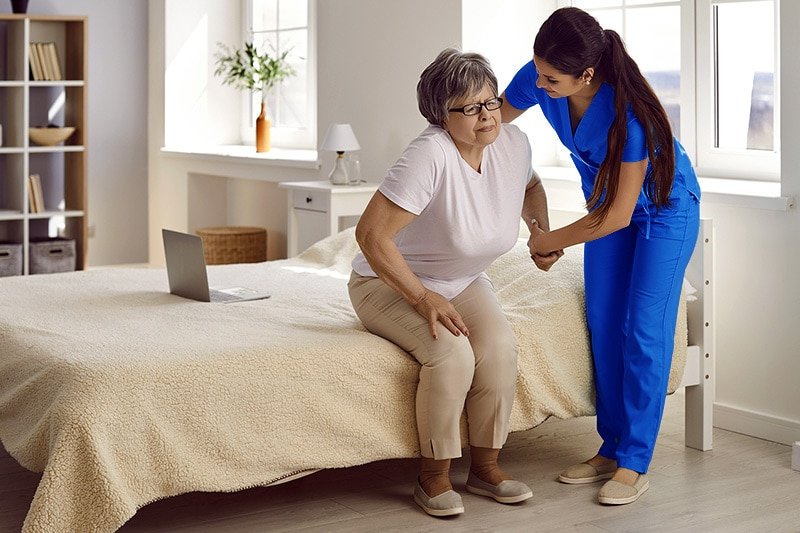The Hardest Part Isn’t the Surgery: It’s the Recovery
For most people, surgery marks the turning point toward better health. Yet what many families discover afterward is that the hardest part isn’t the operation. It’s the recovery that follows. Once the hospital monitors, nurses, and round-the-clock support are gone, even small tasks, climbing stairs, preparing meals, or managing medication, can feel overwhelming.
Healing takes time, structure, and the right kind of help. With proper planning and post-operative support, seniors can recover safely in the comfort of home instead of facing unnecessary complications or hospital readmission.
Why Recovery at Home Feels So Overwhelming
After discharge, the familiar home environment suddenly looks different. What was once simple, a quick shower, reaching a shelf, walking to the kitchen, now requires caution. Common post-surgical challenges include:
Lifting restrictions and mobility limits that make everyday tasks difficult
Complex medication schedules with pain control and antibiotics at precise times
Fatigue or dizziness that can increase the risk of falls
Wound care or dressing changes that require sterile handling
Emotional stress, especially for those living alone or away from family
Without consistent support, these challenges can slow healing or lead to setbacks.
Creating a Safe Environment for Recovery
Before a loved one returns home, it helps to think through the space from a safety perspective. Simple adjustments can make the home recovery-ready:
Clear walking paths and remove tripping hazards such as rugs or cords
Add grab bars or handrails in bathrooms and near stairs
Arrange furniture so essential items are within easy reach
Prepare a rest area—a comfortable chair or bed on the main floor to minimize climbing stairs
Stock up on easy, healthy meals and hydration supplies
A few small changes can reduce stress and allow seniors to focus on healing rather than worrying about daily logistics.
Managing Medication and Pain Safely
After surgery, keeping track of prescriptions can be daunting. Many seniors leave the hospital with multiple medications antibiotics, blood thinners, or pain relief, each with specific timing or dosage rules.
Helpful strategies include:
Written medication charts or labeled pill organizers
Set alarms or smartphone reminders to stay on schedule
Keep emergency contact numbers visible in case of adverse reactions
Record pain levels and side effects to share with doctors during follow-ups
A caregiver’s assistance can make this process smoother, ensuring medications are taken correctly and helping to notice early warning signs of complications.
Mobility: Moving Carefully, but Consistently
Staying still too long can slow recovery, but moving too soon can cause injury. Many seniors struggle to find the right balance between rest and activity.
Caregivers or family helpers can:
Provide steady physical support when walking or standing
Encourage gentle movement exercises as recommended by the surgeon
Help with transfers from bed to chair or to the bathroom without strain
Keep pathways clear and ensure the home is well lit
Gradual, assisted movement promotes circulation, reduces stiffness, and prevents falls.
Nutrition and Hydration During Recovery
Good nutrition speeds healing. Seniors recovering from surgery often have reduced appetites, yet the body needs protein, vitamins, and hydration to rebuild tissue and fight infection.
Caregivers can help by:
Preparing balanced, easy-to-eat meals that meet post-operative dietary restrictions
Offering frequent fluids to prevent dehydration
Monitoring weight, swelling, or appetite changes for early intervention
These small, consistent efforts make a big difference in long-term recovery outcomes.
Emotional and Mental Health: The Overlooked Side of Healing
Recovery is not just physical. Seniors may feel anxious about their progress or frustrated by dependence on others. Loneliness or fear of “doing something wrong” can lead to stress, which slows healing.
Companionship and encouragement play a vital role. A calm conversation, help with a favorite activity, or simply having someone nearby provides reassurance that recovery is on track.
When Professional Support Makes the Difference
Families often want to help but may not have the time or medical knowledge to manage complex care routines. That’s where professional in-home caregivers can bridge the gap between hospital discharge and full independence.
Post-operative caregivers can:
Monitor for signs of infection or complications
Track pain levels and medication schedules
Provide assistance with bathing, dressing, and light movement
Help coordinate follow-up appointments or physical therapy sessions
Offer companionship and reassurance during recovery
This support not only ensures safety but also allows family members to focus on emotional connection rather than constant worry.
How Elite Care Northwest Can Help
At Elite Care Northwest, we understand that recovery doesn’t end when you leave the hospital. It begins at home. Our licensed caregivers provide:
Post-surgical support with mobility, dressing changes, and comfort care
Medication reminders and coordination with your healthcare team
Meal preparation and hydration management for better healing
Safe movement assistance to prevent falls or strain
Emotional companionship to reduce stress and promote well-being
With our physician-led oversight, every care plan is personalized to your medical and recovery needs. Whether you need short-term post-operative help or ongoing in-home care, ECNW ensures that healing at home is safe, structured, and truly supportive.
Contact Elite Care Northwest today to learn how we can help your loved one recover confidently in the comfort of home.


